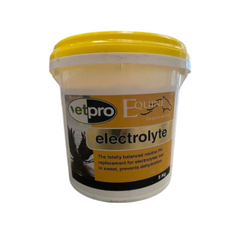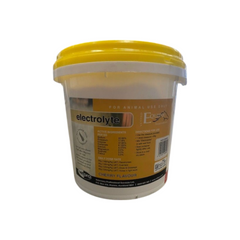Your Cart is empty
VP Equine Electrolyte Cherry 5Kg
$82.00
The physical exertion involved in training and competition generates a rapid rise in body temperature. Horses rely solely on sweat to dissipate this excess heat, and proper muscle function depends on efficient sweating. Sweating is also the main way horses...
Shipping & taxes calculated at checkout
SHIPPING INFO
If this product is currently in stock and if you order by 1pm your order will be despatched the same day. If the product is not in stock you will be contacted.
The physical exertion involved in training and competition generates a rapid rise in body temperature. Horses rely solely on sweat to dissipate this excess heat, and proper muscle function depends on efficient sweating.
Sweating is also the main way horses lose fluids and electrolytes, with substantial amounts of water and essential minerals being expelled during this process.
Electrolyte levels in equine sweat:
Chloride: 7g/litre
Sodium: 4g/litre
Potassium: 1.3g/litre
Magnesium: 0.13g/litre
Calcium: 0.25g/litre
Phosphorus: 0.03g/litre
It is critical to replenish these electrolytes promptly, either through diet or supplementation. While a standard diet may seem sufficient, it often falls short of meeting the demands of active horses. For example, a diet of 6kg grass/hay, 3kg oats, and 3kg sweet feed without added electrolytes would provide the following compared to actual requirements:
Crude Protein: 1200g (needed: 1300g)
Digestible Energy: 30mCals (needed: 30mCals)
Potassium: 145g (needed: 55g)
Sodium: 18g (needed: 42g)
Calcium: 60g (needed: 47g)
Magnesium: 19g (needed: 22g)
Chloride: 46g (needed: 80g)
Deficiencies in sodium, chloride, and magnesium are common, especially during intense work or hot weather when sweat losses are high. Horses don’t store these key electrolytes, making daily replenishment essential. Excessive supplementation, however, can lead to increased water intake and urination, so precise adjustment based on workload and environmental factors is necessary.
A well-balanced electrolyte supplement should include sodium and chloride in a 2:1 ratio, with appropriate levels of calcium and magnesium. Potassium, often abundant in forage-based diets, is rarely deficient.
Contrary to past theories, the idea of separate acid or alkaline electrolyte supplements is now considered unnecessary. The equine kidney, when functioning properly, can maintain the body’s electrolyte balance as long as chloride levels in the diet are sufficient to support this process.
It’s challenging to assess a horse's electrolyte balance via a single blood test; simultaneous blood and urine samples are required. Always consult your veterinarian for accurate assessments.
Available in various sizes: 5kg





